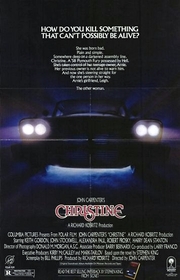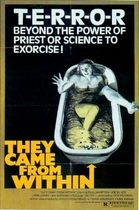Our editor-in-chief Nate Yapp is proud to have contributed to the new book Hidden Horror: A Celebration of 101 Underrated and Overlooked Fright Flicks, edited by Aaron Christensen. Another contributors include Anthony Timpone, B.J. Colangelo, Dave Alexander, Classic-Horror.com's own Robert C. Ring and John W. Bowen. Pick up a copy today from Amazon.com!
Christine (1983)
There was a time where you could hardly get away with being a major horror film director without having at least one Stephen King adaptation to your name. Brian De Palma had one. So did Tobe Hooper and David Cronenberg. George Romero had two. So, really, it's no surprise that John Carpenter also weighed in with his attempt at King's maniac car book "Christine." What is a little odd, though, is that, although the film is entertaining enough, it's more than a little muddled.
The essential problem is that Carpenter's working with a lot of different storyline ideas that aren't his own. While he did a fine job with subtext in Halloween (perhaps too good a job - sometimes it seems like sub-subtext), in Christine he misses a few juicy opportunities, seemingly more interested in getting to the monster of the piece (a '58 Plymouth Fury) than developing interesting characters.
For example, the movie starts off well enough (after a fairly unnecessary prologue that explains nothing). We meet Arnie (Keith Gordon), who is Exhibit A in the Hall of Nerds. Arnie wears glasses, can't seem to get his brain to relay messages to his body quick enough, and withers under pressure. His best friend Dennis (John Stockwell) is popular and well-liked. The two make an odd pair, but to see them together is to know their friendship is a true one (and a bit complex - Stockwell, intentionally or not, hints at an edge of repressed homosexual desire for Gordon's character). We also get to see how a nerdy Arnie interacts with the larger world around him.
However, once Arnie finds and becomes obsessed with the car Christine, the focus narrows extremely, and we lose the high school setting entirely, as well as most of the supporting characters. The car turns Arnie into a cocky, angry young man... well, we have to assume the car does it, anyway. Carpenter moves the focus to Dennis long enough so that we don't see the gradual metamorphosis. One minute, we're dealing with Arnie-as-nerd, the next, Arnie-as-dude. Personally, I would have been more interested in the corrupting effect of the car, rather than what the film devolves into afterwards: Michael Myers as a classic car with the motives of Carrie White.
After a pivotal scene involving some really mean hoodlums (or sh--ters, as the film's vernacular would have it), we get to see a few scenes of a car running over things, while John Carpenter's adequate synthesizer score plays in the background. Sure, we get it. Christine's a vengeful vehicle. I also get that the car's relationship with Arnie is a bit more weighty than your standard man-and-machine relationship. I like these ideas, but they're useless if you don't do anything with them. Of course, a respected horror director in the good part of his career would see that these things are explored, right?
Nope. Carpenter just seems to want to get things moving to his fairly standard and unsuspenseful climax, and isn't particularly interested in the dimensions of the character relationships. I mean, why is this car evil? There's no explanation. Why can it do the things it can? I'm not asking for concrete answers, but all I'm left with is a stupid guess that the automobile's malice comes from its bright red paint job. I have to believe that the King novel goes into more detail about this.
To be fair, Gordon's performance is quite excellent. As hapless as his nerd is, it's a realistic nerd (okay, maybe the glasses were a bit too much). Arnie's just another social outcast, and Gordon resists overplaying him as a stereotyped geek, and never really lets go with the character until he's firmly insane (in which case he's not only allowed, he's practically required to chew scenery). In the end, you really want Arnie to beat the influence Christine has over him, and come back to his outcast status (which is where he really belongs - if "Buffy the Vampire Slayer" taught us anything, it taught us that the cool people aren't worth the flesh they're covered with).
Christine is a nice little horror ditty in it's way. It's a good example of how a director can take an adaptation in the wrong direction and still come out with something that's a decent time-filler - though it's barely worth the price of a rental, what with so many other great films out there and all.
Trivia:
Dennis pulls a copy of Stephen King's original novel off the shelf before he asks Leigh (Alexandra Paul) out.









Certain scenes of the film -
Certain scenes of the film - and by extension the novel - boredered on cheesy. Like where the car repairs itself, etc. Regrettably, the film version seems more stripped of the novel's depth than Christine was stripped of her former beauty when the two students discovered her in Lebay's driveway. This I honestly blame on that villain in all cinematic matters - TIME. You can tell only so much of a story in so much time, and have to pace your scenes accordingly. Christine does this well.
The car itself - a sort of flying-check that! - ROLLING "Dutchman" in which the ghost of her former owner is imprisoned in the very fabric of the interior, locked forever in the crankcase of her dual-carb motor, in every square inch of her custom blood red paint, and through every cubic foot of her green-lit interior!
The book and film do differ on owners - In the film, the man who sells Arnold the Fury is the owner's surviving brother. In the novel, the man who sells Arnold the Fury is the owner, who does not survive the full novel. In each case, Arnold's angst and desire to be respected set these ghosts free. A cult classic for the ages!
Christine is a piece of
Christine is a piece of un-scary shit.